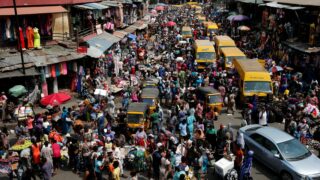Less than 24 hours after a new monetary policy was extended by the Central Bank of Nigeria (CBN), many ATM machines in Ilupeju stopped working. Ilupeju is an industrial estate in the bustling city of Lagos. “No money to withdraw from ATM machines, and the cashiers in the banking halls are saying they don’t have the new naira notes to give,” said a disappointed customer. “People are not many in the banking hall today like they were yesterday (Sunday). Yet no money to give.”
On October 26, 2022, the CBN announced the introduction of redesigned N200, N500 and N1,000 banknotes into the financial system. Hence, a January 31 2023 deadline was placed for a cash swap. Nigerians were informed and advised accordingly.
However, most banks did not have enough new notes to dispense before the deadline, thereby making the implementation unsuccessful. Point of Sale (POS) merchants took advantage of the situation to exploit people. So far, people living in rural communities are the most impacted.
Meanwhile, in megacities like Lagos, POS merchants increased their charges from N100 to N400 for transactions below N5000. Worse still, most ATMs have not been dispensing cash, and mobile banking apps have left many stranded. But this is not the only problem Nigerians are facing currently. There is a lingering fuel scarcity, coupled with an abysmal power supply.
Power outage in Nigeria is no new news. Residents could go without grid electricity supply for days or months. According to World Bank’s estimates, at least 85 million Nigerians (43% of the population) do not have access to grid electricity, making it the country with the largest energy access deficit globally. Nigerians rely on petrol or diesel generators to power their homes and businesses with electricity. But the ongoing fuel scarcity has caused a surge in fuel prices and this has made life unbearable for many Nigerians.
“Some filling stations here, in Ore, sell fuel for N500/ltr. That’s if they eventually sell to you,” said Omonwumi Egbe, a banker in Ondo state. “Currently, we are at the mercy of black market hawkers who sell for N700 or N800/ltr.”
These statements were quite disconcerting. At the beginning of the year, some gas stations sold fuel for N185/ltr. Two weeks ago, gas stations in Lagos sold fuel for N300/ ltr. It’s January 3oth and Egbe’s statement sounds outrageous to me.
Ondo is not as busy as Lagos, so why the excessive hike? This prompted me to reach out to residents in Nassarawa, Delta, Port Harcourt, and Katsina, to inquire about the price of fuel and what it costs to get the new naira notes. Below are my findings:
“Fuel sells for N350/ltr here in Lafia. But it is a different ball game for those in the villages. I hear prices range between N450 to N600/ltr, depending on your bargaining power,” said Destiny Omosimuwa, a farmer in Lafia. “Regarding the cost of getting the new naira, the prices vary from one POS operator to the other. Sometimes, you can pay N100 or N150 to withdraw N10,000 from them, here in Lafia.”
Lafia is the Capital city of Nassarawa State. Most banks are situated in this city. “POS transaction is fair here compared to the villages. It is more expensive to swap the new notes with black market hawkers. They sell on a 10% basis. So, you get charged N1,000 for a N10,000 transaction.”
“We at Agbo have accepted our fate to buy fuel at N800/ltr. We need the fuel and filling stations are not always open. So, whatever price we get it at the black market, we buy,” said Udoka Ossai, administrative staff with an energy firm in Delta State. “Concerning the new money, even with the banks around, you still need these POS guys. They now charge N300 for N5000 withdrawal downward. Something that used to be N100.”
People living in Port Harcourt are also facing these problems but on a medium scale. “A litre of petrol goes for N380 or N400 in the filling stations while the black market sells for N500 or N600,” said Funmi Umukoro, an Engineer with an energy firm in Rivers State. According to her, POS charges on the new note in the oil city are relatively bearable. “Before now, some POS will charge you N100 for N10,000. But now it’s N200.”
Iliyasu Yahaya, a school teacher in Katsina main town, said, “we buy fuel for N300 or N320 in filling stations. Prices have been going up since the end of last year. Some have dropped the constant use of their cars for public transport now because it is cheaper to do so.” As per the cost of getting the new naira, “the POS merchant on my street still charges me the same price, N100 per transaction. But I hear it is a bit expensive in the villages.”
The new monetary policy was introduced to prevent counterfeits, corruption, and terrorist funding, President Muhammadu Buhari had said. More so, it was geared to stabilise and strengthen the Nigerian economy. Between October 2022 and now, Nigeria has recovered over N1.3 trillion in old notes, most of which were stashed in people’s private safes.








